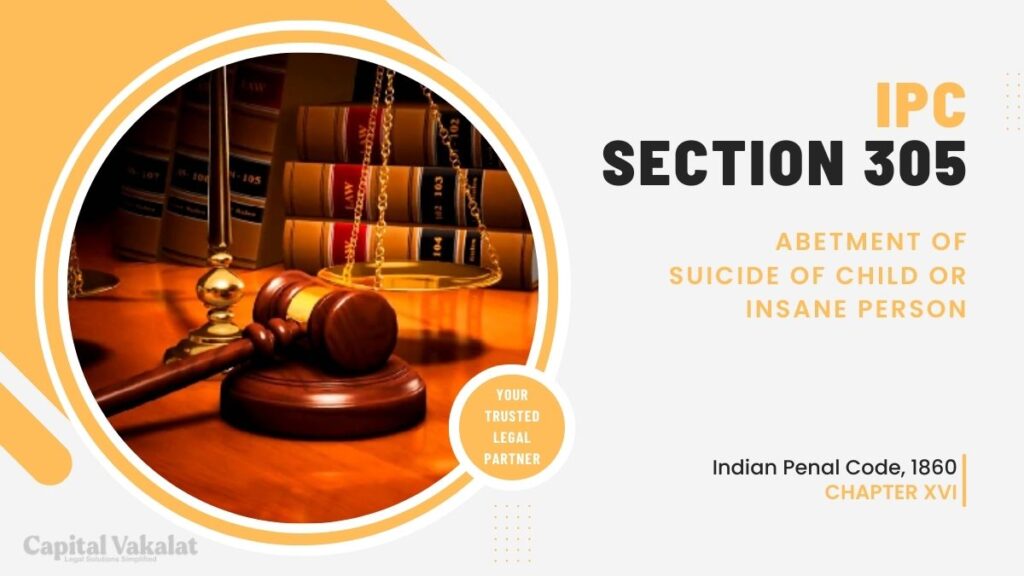Section 305 of the Indian Penal Code (IPC) addresses the abetment of suicide of a child or an insane person. This legal provision holds significant importance in safeguarding the most vulnerable members of society.

In this article, we will delve into the intricacies of Section 305 IPC, exploring its implications, societal impact, and the challenges in its enforcement.
Understanding Section 305 IPC
Section 305 IPC outlines the legal consequences for individuals involved in abetting the suicide of a child or an insane person. Abetment involves intentionally aiding, counseling, or instigating the act of suicide. It is crucial to differentiate between abetment and the direct commission of suicide, as the legal implications vary significantly.
Laws Protecting Children and Insane Persons
In addition to Section 305 IPC, various legal frameworks aim to protect the rights and well-being of children and insane persons. These frameworks highlight the need for special consideration and care for these vulnerable populations, emphasizing the responsibility of society to provide a safe environment.
Impact on Society
The abetment of suicide has far-reaching implications for society. This section of the IPC acknowledges the heightened vulnerability of children and insane persons and seeks to deter individuals from exploiting their vulnerability for malicious purposes. Addressing this issue is crucial to maintaining a just and compassionate society.
Notable Cases
Examining past cases related to Section 305 IPC provides insights into the legal precedents and societal responses. Analyzing these cases helps in understanding the nuances of the law and its effectiveness in delivering justice to the victims.
Challenges in Prosecution
Despite the legal provisions, prosecuting cases under Section 305 IPC poses challenges. Establishing abetment requires a thorough investigation and presentation of evidence, often complicated by the sensitive nature of these cases. Exploring these challenges is essential for improving legal procedures.
Preventive Measures
Preventing the abetment of suicide necessitates a multi-faceted approach. Education, awareness, and community involvement play pivotal roles in creating an environment that fosters the well-being of children and insane persons. Implementing preventive measures can significantly reduce the occurrence of such tragic incidents.
Role of Mental Health Awareness
Recognizing the importance of mental health awareness is crucial in addressing the abetment of suicide. Stigma surrounding mental health issues must be reduced, and support systems for individuals dealing with mental health challenges should be strengthened. This proactive approach contributes to a healthier and more empathetic society.
International Comparisons
Comparing Section 305 IPC with similar laws in other countries provides valuable insights into the effectiveness of different legal approaches. Understanding international practices can inform improvements in the Indian legal system and contribute to a more comprehensive and globally aligned framework.
Conclusion
In conclusion, Section 305 IPC stands as a critical legal provision in addressing the abetment of suicide involving children or insane persons. The societal impact, legal challenges, and preventive measures discussed underscore the importance of continuously evaluating and improving our legal and social frameworks to ensure the well-being of the most vulnerable members of our community.
Frequently Asked Questions
How can society contribute to preventing the abetment of suicide?
Society can play a crucial role through education, awareness, and fostering a supportive environment that prioritizes mental health.
Are there any recent amendments to Section 305 IPC?
As of my last knowledge update in January 2022, there were no recent amendments. Please check the latest legal updates for the most current information.
What challenges do investigators face in prosecuting cases under Section 305 IPC?
Challenges include the sensitive nature of cases, the need for thorough evidence, and complexities in establishing abetment.
How can international comparisons benefit the improvement of Section 305 IPC?
Comparisons with other countries’ legal frameworks can provide insights into best practices and contribute to the ongoing enhancement of Indian laws.